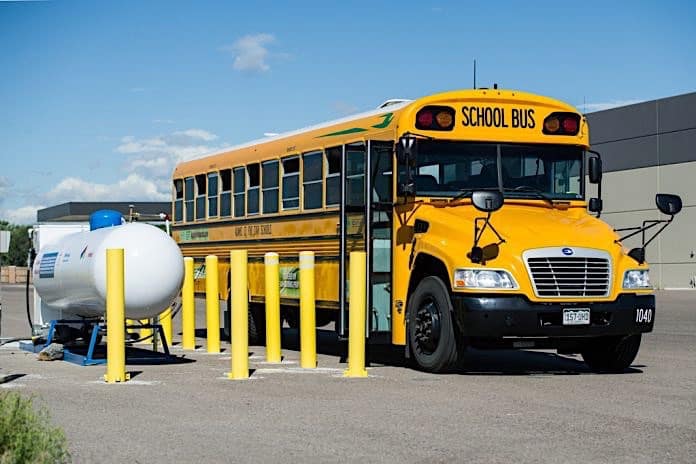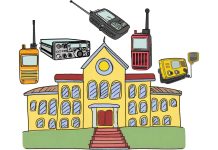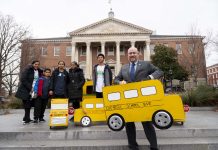One of the more spirited national conversations in recent years has focused on the impact transportation has on the environment, and the ecological solutions necessary to ensure that our children have sustainable futures.
Beyond that, however, much attention has also been placed on fuel efficiency, and alternative fuels promise big savings over diesel and gasoline, as well as reducing labor costs in the garage.
While diesel continues to power the vast majority of the nation’s fleet, school districts have still responded with giant leaps forward in promoting greener technologies for bus fleets with the use of alternative fuels, such as electric, compressed natural gas (CNG), propane or biodiesel.
The Washoe County School District in Reno, Nevada, for instance, has a fleet of 325 buses that all run on alternative fuel. “The diesel powered buses all run B5 Biodiesel since 1997,” said Assistant Transportation Director Todd Duncan, .
The district attempted to incorporate CNG into their fleet, yet the cost per mile, along with maintenance expenses, forced Washoe County to abandon the decision.
In 2013, the district introduced propane buses to the fleet. This year, that portion will grow to 47 buses. “The experience thus far has been very positive with lower fuel prices, lower maintenance costs and overall performance has been exceptional,” said Duncan, who will present at this month’s STN EXPO about the district’s alt-fuel experiences.
The July 28 session at the STN EXPO provides attendees a conversation on how districts are implementing various alternative fuels into bus fleets. The next day, the inaugural Green Bus Fleet takes the conversation to the next level by bringing in federal and state agency representatives, alternative fuel industry leaders and school as well as transit and commercial bus operators to discuss funding, implementation costs and more.
School districts are committing to managing natural resources, supporting energy conservation and cutting waste. Through the use of these green initiatives, the districts are also reducing energy usage, decreasing carbon footprints and saving tax dollars.
This has been the case at the Adams 12 Five Stars Schools near Denver, which initially sought CNG for the fleet; however, the price for the infrastructure proved too costly. Since then, the district has had an effective four-year run using propane.
The initial success exceeded all expectations, according to David Anderson, director of transportation and fleet and also an EXPO as well as Green Bus Summit speaker. The district has expanded the program, recently purchasing a number Roush CleanTech Blue Bird buses. “We started with three propane buses the first year. We will have 25 propane buses ready for students by this fall,” said Anderson. “
The Push to Go Electric
The Napa Valley Unified School District (NVUSD) has the distinction of being one of the few school districts in the nation to operate a bus fleet that runs almost entirely on alternative fuels.
For more than a decade, NVUSD has been a leader not only in California but nationwide for its implementation of buses that utilize the latest in CNG and hybrid technology.
The application of clean energy sources to power its fleet is an effort of the district to increase fuel efficiency, save NVUSD money and reduce emissions. The program has been a complete success, according to Ralph Knight, NVUSD transportation supervisor and a return presenter at this month’s STN EXPO.
“It’s about saving the district and taxpayers money,” said Knight, who is also an advisor for the inaugural Green Bus Summit on July 29. “Dollars and cents wise, it was an easy decision to make.”
At first, Knight said it was challenge to convince people to commit to the change, especially upon seeing the price tag of the green vehicles. Without grant funding, he said he realizes that the program would not have been able to purchase the initial buses. “Change is not an easy task,” said Knight.
Once the buses were in service, though, there was no doubt that NVUSD was headed in the right direction. Fuel costs to the district were immediately cut in half, and the savings have been growing since then.
Of the 72 buses in the fleet, only a few of the older models remain entirely diesel powered, and even those are being retrofitted to run on alternative fuels, said Knight.
The IC Bus hybrids employ Enova’s Charge Depleting System. The district’s other school buses are Blue Bird CNG units powered by either Cummins or John Deere engines, , Collins Buses on Ford chassis with either the Azure hybrid drive train or CNG engines for special needs routes, and the Thomas Built Buses Saf-T-Liner C2e Eaton hybrid. Knight added that the bus fleet services roughly 1,700 students daily, logging almost 17,000 miles per year.
When NVUSD obtained its first plug-in hybrid electric school bus in 2007, the district became the first in the Golden State to have one. The push for the hybrid was part of a nationwide initiative called the Plug-In Hybrid Electric School Bus Project. While momentum for hybrids has waned since due to low market acceptance, the ultimate goal for NVUSD, according to Knight, is to have an entirely electric bus fleet, reserving CNG buses for longer trips.
“True electric buses are the perfect vehicle for home to school operations,” said Knight. “With the application of solar-powered charging stations, costs go down to nothing.”
Currently, NVUSD has plans to open six solar-powered charging stations for public use. The project should wrap up later this year.
Cheap and Clean Propane
Named one of the top fleets in North America, Humble Independent School District near Houston has been a strong proponent for upgrading its student transportation services to lower its environmental impact.
In the past four years, the district enhanced its fleet by incorporating buses into the fleet that run on propane, providing a clean alternative to traditional fueling sources.
Humble ISD Assistant Director of Transportation Mark Swackhamer, CAFM, who joined the district a year ago from Houston ISD, has been a longtime advocate for green transportation, specifically propane. “Propane buses are cleaner and cheaper to run, saving the school district money on fuel costs,” said Swackhamer.
The use of propane reduces exposure to the harmful effects of diesel exhaust inhaled by students. It also cuts down on the amount of air pollution typically created by diesel engines.
The switch to propane buses also saves the school district thousands of dollars each year. “The goal is to reduce replacement costs along with reducing fuel costs,” said Swackhamer.
Propane fuel prices are on average $1.49 per gallon. Alternatively, diesel fuel is roughly $3.80 a gallon. According to Swackhamer, “These are costs that are taken on by taxpayers.”
Currently, Humble ISD operates 27 Bluebird Vision Propane buses. Swackhamer, who has over three decades of fleet manager experience, has grown that number by securing 20 more propane buses through grant awards. The new Bluebird buses should be in service in a year, replacing some of older buses the fleet runs.
The district began the program in 2011 after receiving almost $3 million in grant funding from the Texas Commission of Environmental Quality, which helped with the initial purchase of the propane buses.
Humble ISD operates and maintains more than 250 school buses that transport almost 12,000 students daily traveling. The buses log more than 2.5 million miles annually.
Biodiesel Conversion
Medford Township Public Schools (MTPS) has been the nation’s longest continuous user of biodiesel to operate its bus fleet, utilizing this green technology for almost two decades.
This conversion to biodiesel started as a pet project of Joseph Biluck, the district’s director of operations and technology, but the decision was not an easy one. Initiated in 1994, the program didn’t receive funding for two years, when the school district finally was awarded a grant by the U.S. Department of Education.
By 1997, MTPS became the first district in New Jersey to operate a school bus powered by biodiesel after being awarded $115,000 for a demonstration program. “We have a progressive board in Medford,” said Biluck. “Now the use of biodiesel has become part of the culture.”
Currently, the MTPS fleet is comprised of 55 biodiesel buses. The benefits of transitioning to biodiesel, according to Biluck, include energy security, broad application, ease of use and emissions reduction.
The MTPS biodiesel fleet has logged more than eight million miles on the road, consumed nearly one million gallons of biodiesel, displaced almost 200,000 gallons of diesel and reduced expenses by more than $150,000.
Biodiesel is used in any diesel engine, both new and old, and is stored and dispensed from any standard fuel island. “Biodiesel buses comprise a majority of our fleet,” said Biluck. “These buses have proven themselves, no question about it.”
The technology has not only been applied to school buses, but also dump trucks and off-road equipment, which helps eliminate smog-forming emissions and diesel particulate matter.
Biluck stated that reducing the fleet’s environmental impact has been a principal objective. Recent studies have found that on any given day, children riding school buses can inhale seven to 70 times more exhaust from that bus than a typical Los Angeles resident breathes in from all school bus emissions in that day.
Since its initiation in 1997, the MTPS has eliminated more than 123,000 pounds of smog forming emissions along with nearly 2,500 pounds of diesel particulates.















